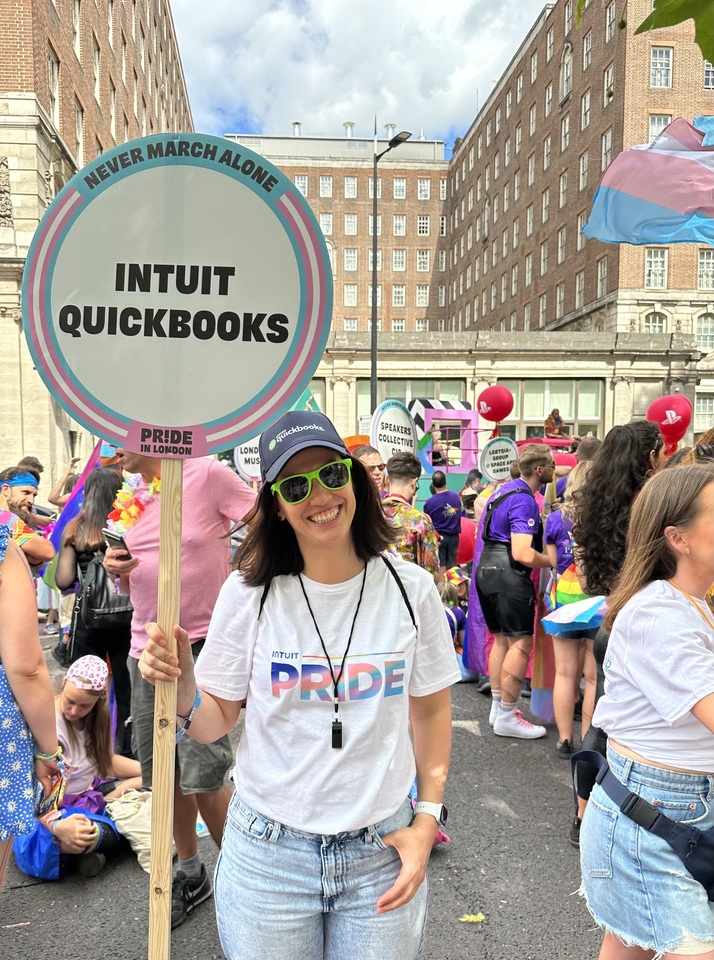The term “allyship” has gained popularity in recent years as a way to describe the actions and attitudes of individuals who support underrepresented groups. At work, allyship is about fostering a culture of belonging by supporting and championing colleagues of all identities, backgrounds, and perspectives.
Allies recognize and advocate for the rights and dignity of individuals who face discrimination and oppression. These groups can include people of color, women, LGBTQ+ individuals, people with disabilities, and others who may be marginalized or underrepresented in society.
As we look ahead to Intuit’s 2024 Trans+Summit, we’re going to deep-dive into how to become active allies to trans+ and the non-binary community.
Becoming an active ally
Being an active ally means taking concrete steps to support individuals and the communities they belong to 365 days of the year. Aside from taking smaller actions in your day-to-day, like embracing gender-neutral terminology, here are a few steps you can take toward becoming a better ally to the trans+ and non-binary community:
- Listen and learn. Being an ally is to listen to and learn from the experiences of underrepresented individuals. This means being willing to have difficult conversations, acknowledging possible biases you may have, and educating yourself about the issues affecting different communities. Take the time to educate yourself about the trans+ and non-binary community rather than asking a member of the community to do it for you.
- Ask others for preferred pronouns. Bringing up pronouns when introducing yourself and meeting others demonstrates the importance of using inclusive language. To help with this, Intuit created an inclusive language playbook for anyone to access and leverage.
- Be an advocate. Regardless of your role within your company, when you advocate for policy changes, like gender-neutral bathrooms or inclusive hiring practices, you’re helping create a safer place for people who are trans+ or non-binary.
- Examine your experience. As an ally, it’s important to recognize the ways in which your own background and experience may be influenced by cultural and societal privileges and could contribute to individuals/communities feeling that they are not visible or valued. This means being willing to step back and listen to marginalized voices, and being mindful of the ways in which your actions may impact others.
- Consider resource groups and ally programs. Forming a Pride employee resource group or an allyship program can help give LGBTQ+ colleagues visibility and a seat at the table. Programs like these can also help build tangible ways for others in your organization to learn and grow so that they can participate in meaningful actions to support the community.
- Be an active upstander. Allies have a responsibility to use their position and influence to speak out against discrimination and injustice. This may involve challenging harmful comments or behaviors, and “passing the mic” to others to give a voice to the voiceless.
In the workplace, what does allyship look like?
Allyship is essential to creating an inclusive work environment where everyone feels valued, respected, and empowered to contribute to their best work. One of the simplest steps you can take is to include your pronouns across your work profiles. It could be adding pronouns to your email signature, any messaging apps your organization uses and in your video conferencing profile.
You might also take inventory of the words you use in everyday situations. For example, how many of us have used the word “guys” when addressing mixed-gender groups in meetings or email introductions? Try using gender-neutral words instead—such as “folks,” “team,” or “y’all.” These small changes can help people who are trans or non-binary feel a sense of belonging and more importantly, safer in the workplace.

Allyship transforms culture and attitudes
Organizations that foster allyship in the workplace experience increased productivity and performance, and are more likely to attract and retain a diverse workforce. An ideal outcome of active allyship is to create a cultural shift in an organization that enables everyone to feel safe, accepted, and able to bring their whole self to work.

At Intuit, taking bold action—such as creating the Trans+ Summit—has cemented allyship as a core tenet of our culture. The event draws hundreds of people every year.
“Intuit, as a whole, has always been a front runner when it comes to having inclusivity and safety in a work environment. You’re never swept under the rug or pushed aside here, you’re held up and supported. I have worked at several companies in different industries and I have never felt my whole self was truly appreciated, welcomed, and supported until I came to work at Intuit.”
Lyric Hill, Senior Expert Bookkeeper
We’re proud of the job we’ve done developing allyship at Intuit and that’s clear through support from top leaders, too. Intuit held the fourth annual Trans+ Summit in 2023, where our CEO, Sasan Goodarzi, opened the annual event, further supporting our company’s focus on diversity, equity, and inclusion for the LGBTQ+ community. As a part of his welcome speech, Sasan shared with audiences, “Diversity is a fact, but inclusion is a choice.”
When employees feel that their colleagues and leaders are committed to creating a positive and inclusive culture, it can boost morale and increase job satisfaction.
How will you work to foster allyship in the workplace and better support your colleagues?
____________
Register for the 5th annual 2024 Trans+ Summit here: https://transsummit.intuit.com/2024.
At Intuit, we aim to foster positive experiences at every level of someone’s professional journey. If you are interested in joining our team, check out our open positions.
Intuit is an Equal Opportunity Employer. For more information about our EEO policy, please click here.